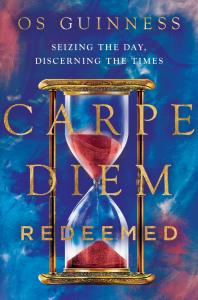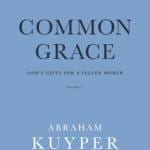How do you think about time? Are you, like most Americans, living in the present and ignoring the wisdom of the past and the pressing necessity of the future? If the answer is “yes” (and, come on: the answer is certainly ‘yes’) the Os Guinness wants to have words with you. Specifically, he wants you to read and think about his newest book Carpe Diem Redeemed: Seizing the Day, Discerning the Times.

Before I get to the strengths of the book, or even the summary, I want to get the weaknesses out of the way. Carpe Diem Redeemed is a scattered series of reflections on time drawn from both philosophical sources and pop culture. It is not so much a systematic and organized reflection as it is the rough equivalent of breaking in on someone in their study, gathering an armful of notes off of their desk, and stapling them all together in a short book. We’re seeing the middle of a reflection that has clearly been long in the making and is obviously deeply important. We’ve just not seen its beginning or witnessed the structures being raised. Nor is the reflection finished. Which isn’t to say that we can’t get anything from it, just that this book could have used more working out.
The strength of the book, which more than offsets its weakness, is that it is certainly true. To give Guinness’ own summary:
“My argument here is simple, straightforward, and a sure way forward. Seizing the day and making the most of life must not be flaunted in the face of impossibility or absurdity; the ideal requires a vision of life capable of fulfilling it. And that, I will argue, can best be found within an ultimate belief, a faith, a relationship, a trust that does justice to the deepest meaning of time, of history, and of human significance and enterprise.
In short, seizing the day, making the most of life, and understanding the meaning of life are inseparable. All three require that if we are to master time, we must come to know the author of time, the meaning of time, and come to know the part he calls us to play in his grand story, which makes the deepest overall sense of time and history. Even more, wonder of wonders, we are then invited to live lives that align our individual hopes and destinies with the very purpose and destiny of the universe itself.” (9)
Again, Guinness is certainly right. We are far too caught up in our now-centered narcissism without an understanding of context or a feel for either the importance and influence of the past or the impending weight of the future. Modern Evangelicals, perhaps especially modern American Evangelicals, are both shallow and lazy when it comes to thinking about the importance of time. We see this many places in our lives, but especially in corporate worship:
“But much of the run-of-the-mill renewal songs… confine Evangelicals within a shallow theology, threadbare worship, fleeting relevance, and historical amnesia. Above all, they deprive Evangelicals of the collective praise of Christians down through the ages as they respond to the grandeur of God in generation after generation. Christians rightly disdain politically correct thinkers who draw up their skirts in horror at anything in the past that offends their current sensibilities. Such thinkers refuse to enter the ‘chat room of the centuries’ that is the three-thousand-year conversation of our civilization. But in a similar way, much contemporary Christian music childishly shuts itself up in the world of post-2000 music and has no idea of the great, rich ‘worship service of the centuries’ that it is too self-absorbed to join.” (108)
No reasonable and honest observer can disagree with this assessment. And what is true about worship is true about all of our lives. We ignore the past and the future in honor of the impulse of the moment. That is exactly how it should not be, particularly as people who believe that our full salvation was already accomplished in the past on the cross, and is not yet finished in the final gathering of God’s people at the return of Christ. We live best in the present and are best able to seize the day or declare YOLO or whatever the current inanity is only when we see the present in its context between the past and the future. Then we are able to live as full human beings and as faithful Christians. Carpe Diem Redeemed has something to say here, and is, well, it’s worth your time.
Dr. Coyle Neal is co-host of the City of Man Podcast and an Associate Professor of Political Science at Southwest Baptist University in Bolivar, MO












